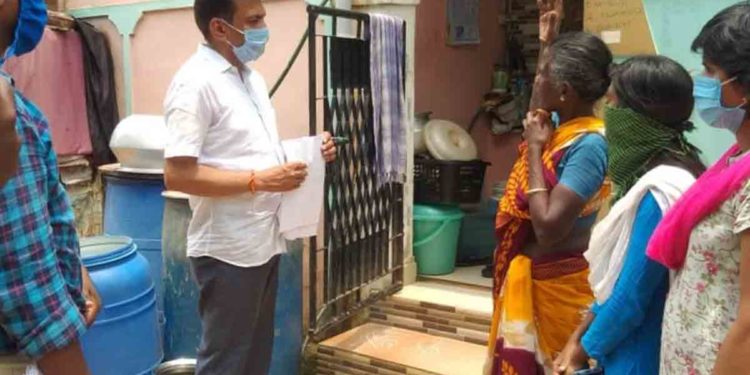In wake of the rising COVID-19 cases in Vizag, GVMC Additional Commissioner R Somannarayana instructed Asha Workers, Ward Volunteers, zonal commissioners, and all concerned personnel to conduct door-to-door surveys in every house in the containment clusters. Stating that new areas in Vizag have been declared as containment clusters, the Additional Commissioner also instructed that special emphasis must be laid on testing elderly citizens above 60 years of age, and those with pre-existing illnesses. The volunteers have been instructed to conduct tests for those in vulnerable categories on a priority basis.
Further, Mr Somannarayana instructed that awareness activities, related to COVID-19, must be conducted in the containment clusters identified in Vizag. He stated that wearing face masks is mandatory for people stepping out of their homes. Further, he instructed that public gatherings and other violations should be put in check in these areas with the help of the police department in Vizag. As per the previously set rules, no outsiders will be allowed to enter the clusters. The movement to and from the cluster will be administered via a single route. Further instructions were given to the concerned officials to provide all the citizens within the cluster with their daily essentials.
As of Sunday evening, Rangireji Veedhi, Ramnagar, Dwaramvari Veedhi- North Extension Seethamdhara, Adarsh Nagar were demarcated as the new containment clusters, taking the total number of very active clusters in Vizag district to 36. At present, 38 clusters have been marked ‘active’, and 22 are being treated to as dormant. 25 clusters across Vizag district have been denotified as on Sunday evening.
Last week, District Collector V Vinay Chand called for aggressive testing across Visakhapatnam to restrict the spread of COVID-19. It was announced that the Health Department of the GVMC would be supervising the COVID-19 tests. Further, tests in rural Vizag would be supervised by the District Medical and Health Officer (DMHO). The officials were instructed to identify and test elders in the high-risk category. More vulnerable individuals with pre-existing conditions like diabetes, blood pressure, kidney-related ailments, and pregnant women would also be tested in the coming days.










Discussion about this post